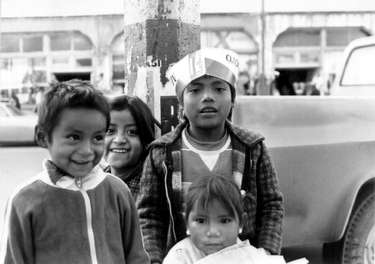The Undeclared War on the Undocumented - Mexicans - the most marginalized group in America
Primary tabs
Four hundred people die a year in an undeclared war fought between US border patrol and Mexicans seeking relief from unremitting, unbearable poverty. Ruben Garcia, director of Annunciation House, a shelter for undocumented people, spoke about his experiences with the most marginalized group "in America".
Last year, more than 400 people died in an undeclared war. Many of them died quietly, alone in the desert, thousands of miles from home along the Mexican-American border. According to Ruben Garcia, director of Annunciation House  a shelter for undocumented people located in El Paso, Texas ‹ the victims of this undeclared war are the undocumented workers who take their lives into their hands as they seek relief from unremitting, unbearable poverty. 
On Saturday, May 15, a lecture and dinner was held at the Quaker Meeting House titled “The Border as Prophet.†Ruben Garcia was speaking about the heavily fortified US-Mexican border, a place where the military/police forces try out their latest immigrant repelling technologies.
He began in jest, “it is great to be in Rochester on the ‘other border.’ But I have yet to see anyone in a green uniform, I have yet to see a patrol truck, a helicopter, nor any motion sensors. This is a completely different world than the border I have come to know. The US-Mexican border area that lacks the understanding of a majority of the people in the US.â€
Almost like ChemLawn comes out with a new pesticide each Spring, the US border company tries out its own line of new products. This year they have new Hummers, S.U.V.’s, cameras that detect body heat, and the promise of a hundred new patrols.
“Four hundred immigrants die along the border each year, more than one per day. They cook in the desert infernos of Arizona, drown in the waters of the Rio Grande, they die of the suffocation and heat stroke that comes when locked into the back of trucks without ventilation. Then too there is the death that comes from the bullets of vigilante groups that prowl the border as well as the bullets of Border Patrol agents whom grand juries classify as justifiable shootings.â€
But after all, they are illegal aliens right. At a recent meeting with civic groups in El Paso, an Italian-American woman raised these sentiments. “As far as I’m concerned, any person who crosses the border illegally should be shot on the spot.†She received applause from many in the crowd.
This prejudice and resentment towards Mexicans proceeds because of shortcuts taken in American storytelling. The glory of Texas, the history of the Lone Star State depends on the continued resonance of mistruth.
In the 1830’s and 1840’s, the US government decided it wanted northern Mexico. US President James Polk began coveting California for its rich harbors and rumors of gold. Mexico owned California then. Polk, locked in a war of words with Mexican President Santa Anna, lined up American troops along the controversial Rio Grande. All efforts were made by Polk to demonize Santa Anna, provoke a Mexican attack and thereby unite the American people behind war.
By 1848, by way of war and treaty, nearly all of northern Mexico came under US jurisdiction. The occupation included New Mexico, Utah, Arizona, parts of Colorado and Wyoming, and California – just in time for the Gold Rush of 1849. Without moving, the people of northern Mexico suddenly became immigrants – immigrants in their own country.
Mexicans today make up 70 percent of the 7 million undocumented residents in the US. Prior to the Great Depression, Mexicans were allowed to cross the border freely. Then when the Stock Market crashed, Americans began to scapegoat their southern neighbors for taking jobs, a nativist outcry that has regained popularity today with all the big US companies outsourcing jobs "to Mexico."
From this anti-immigrant sentiment flowed a stampede of legislation, which then empowered border patrols and citizen vigilante groups to hunt Mexicans down as if they were animals. This undeclared war on the undocumented Mexicans continues relentlessly today. 
Garcia referenced passages from the Bible in his speech. From Exodus, ‘You shall not molest or oppress an alien, for you were once aliens yourselves in the land of Egypt.’ “Time and time again we see in the New Testament that the standard, the measure is what we do to the least among us. But the difficulty is getting my culture, my countrymen to acknowledge and participate in this relationship.â€
Garcia tells of a neighbor who was looking for a maid, but not from Mexico, someone preferably from Central America. “She didn’t want to deal with all the attachments the Mexicans have and keep with family back home. She wanted someone un-connected.â€
Garcia has been making this connection with the undocumented people since 1978. “The only two homeless shelters available 25 years ago wouldn’t take in undocumented people. So we did. That’s the heart and soul of how Annunciation House began this journey with immigrants.†Garcia also drew conceptual connections, between the Cold War, the War on Drugs and now the War on Terrorism.
“For us, the War on Drugs effects only us; what it does to our kids, our laws, our economy, our situation. There is no consideration given to what it does to other countries – how the Drug War destroyed whole nations.
During these wars we become righteous. During the Cold War we criticized the Berlin Wall. ‘Look at those communists, look at how they’re treating their people.’ But in the 28 year history of the Berlin Wall, a total of 280 people died on the border. Here on the Mexican border, it is 400 a year. We have built in a way of thinking that it is acceptable to let these people die.†
Now the US is pumping billions into more security measures for the War on Terrorism, making it even more difficult for immigrants to cross the border. We have to allow law enforcement to do what they’re trained and meant to do and that is respond to crime rather than wage wars on the poor. We have to create an environment of openness.
Garcia proposed reforms that should be made on the federal and local levels. Rejecting the Bush Administrations’ three years and out plan, Garcia said an immigration bill should include a path to permanent citizenship.
While many shelters for immigrants have sprung up on the Mexican side, the El Paso Annunciation House is the only one of its kind on the US side. He challenged the audience in Rochester now.
“Is there a house of hospitality in Rochester? Until there is, I hope none of you have a good night’s sleep. Then Garcia gave the vitalized listeners a big smile.
Librada Paz, a migrant worker attending the lecture, spoke up. “There are hundreds of us here in Rochester that have similar stories to the ones you heard tonight. So if you want to get involved you can.†Paz was one of the lucky immigrants from Mexico to survive the border gauntlet years ago. She is a legal immigrant now and was a member of the 50-plus marchers who trekked to Albany this past month to push for justice for farmworkers.
To find out about more on Annunciation House and possible volunteer opportunities click on the link below.
The Quaker Meeting House is located on 84 Scio St.










